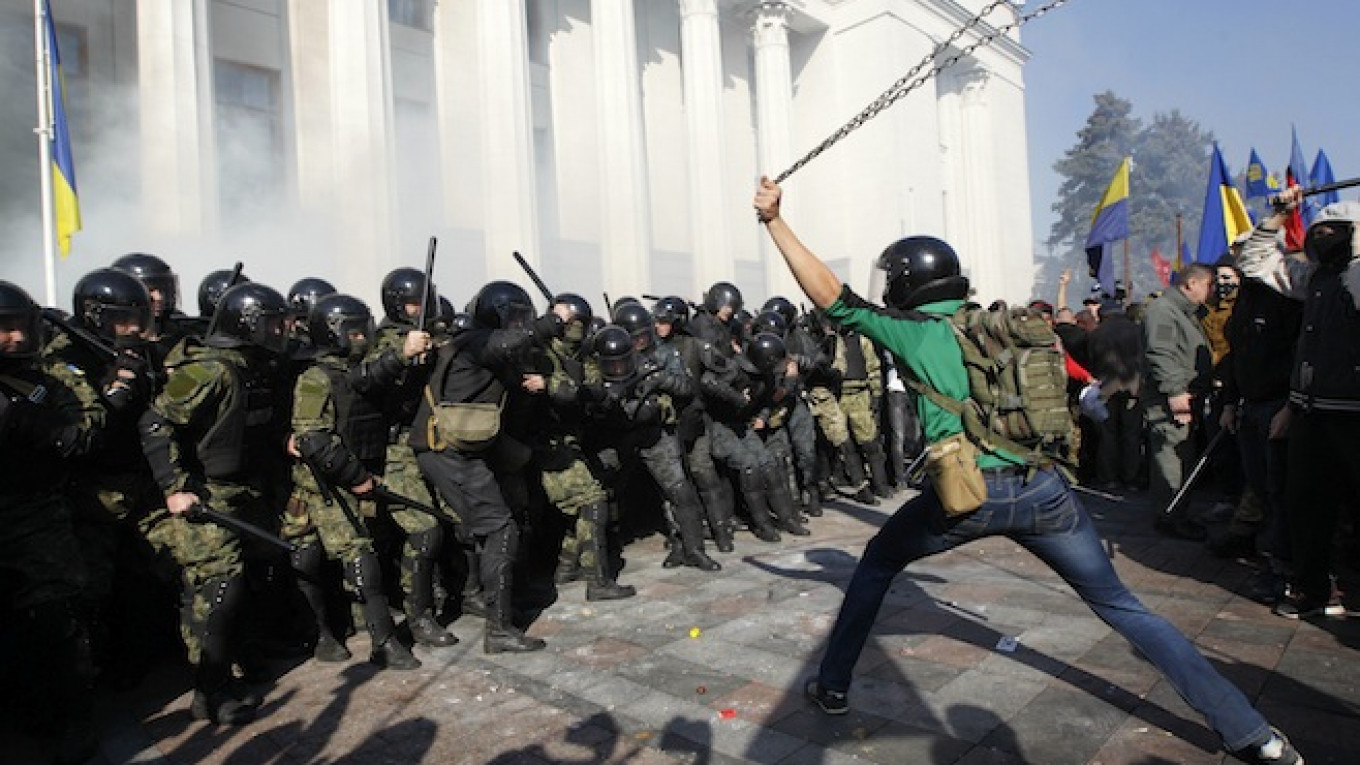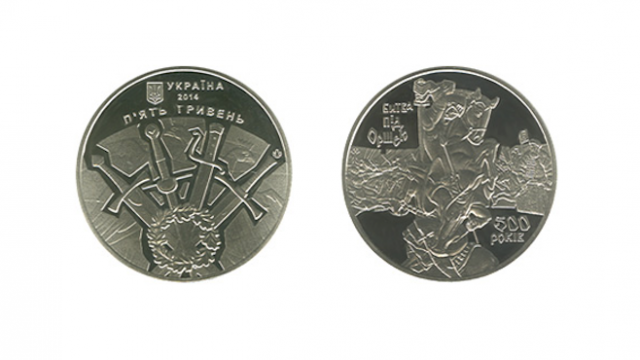Ukraine on Tuesday voted sweeping laws to stamp out corruption and curb Soviet-era state surveillance of political life as its pro-Western leaders acted to meet the demands of its future European partners before an election.
But a demonstration by protesters who clashed with police in the first real anti-government demonstration since the Euromaidan upheaval last winter spelled potential for disorder in the run-up to the election on Oct. 26.
President Petro Poroshenko, elected in May after his predecessor, the Moscow-backed Viktor Yanukovych, was ousted, wants a calm run-up to an election which he hopes will give his government further legitimacy and produce a broad platform to end a separatist conflict in the east and pursue his pro-Europe agenda.
The demonstrators, many of them masked, threw smoke-bombs and used air guns to shoot out windows of the parliament building, forcing an early end to the session, which also voted in a new defense minister.
Their motives and party affiliations were not clear and members of two nationalist parties who were nearby denied any links to the violence.
Legislation moved through parliament is aimed at cleaning up Ukraine's profile and raising the post-Soviet country to European standards as well as head off suspicions by its critics and some in the European Union that it is dragging its feet.
The new laws, which will tackle high-level corruption and reform the prosecutor general's office, have been sought by the EU with which Ukraine has signed an association agreement as part of its post-Yanukovych European agenda.
"The offshore era has ended," Prime Minister Arseny Yatseniuk said, referring to laws under which government, judiciary and law enforcement officials will have to declare their own and their families' assets and financial transactions.
The declared income of civil servants will be measured against lifestyle and property holdings. Officials' bank accounts will be open to monitoring by a state committee.
Reform of the prosecutor's office will curb the functions of a Soviet-era institution that has been long used by authorities in Ukraine as a tool to harass the political opposition.
Bribery has been widespread at virtually all levels of Ukrainian government and public life since independence from the Soviet Union in 1991. International watchdogs say it worsened in the past four years under the ousted Yanukovych.
Under The Microscope
"Now every civil servant will be under the microscope. Those who illegally hold something will be brought to justice," Yatseniuk said.
"We have taken a decisive step in the struggle with corruption, a cancerous tumor which eats away at our society," Poroshenko said after the vote on anti-corruption laws.
The reform of the prosecutor's office relieved it of rights given to it by Soviet dictator Josef Stalin, he said.
In other legislation rushed through at the last session of the current parliament, National Guard chief Stepan Poltorak became new defense minister. He replaces Valery Heteley, who has faced criticism over the rout of Ukrainian forces in the east.
The battlefield losses at Ilovaisk, east of the rebel-controlled eastern city of Donetsk at the end of August, by what Kiev said was direct intervention of Russian troops, forced Poroshenko to abandon attempts to crush the separatists and he called a cease-fire from Sept. 5.
The cease-fire forms the core of his peace plan that would also provide provisional self-rule to the separatists.
But it is increasingly under pressure. A military spokesman said Tuesday that seven more Ukrainian servicemen were killed in the past 24 hours — six of them killed in two landmine explosions — bringing to about 50 the number of Ukrainian troops killed since the cease-fire came into force.
Opinion polls suggest Poroshenko's political bloc will perform well in the election, bringing him the coalition of support he is hoping for.
But he faces internal opposition from parties who fear he may make too many concessions to the separatist leaders in the heavily industrialized, mainly Russian-speaking east, who are pressing for unity with Russia.
The United Nations says more than 3,600 people — Ukrainian troops, separatists and civilians — have been killed in eastern Ukraine since fighting erupted there in April.
A Message from The Moscow Times:
Dear readers,
We are facing unprecedented challenges. Russia's Prosecutor General's Office has designated The Moscow Times as an "undesirable" organization, criminalizing our work and putting our staff at risk of prosecution. This follows our earlier unjust labeling as a "foreign agent."
These actions are direct attempts to silence independent journalism in Russia. The authorities claim our work "discredits the decisions of the Russian leadership." We see things differently: we strive to provide accurate, unbiased reporting on Russia.
We, the journalists of The Moscow Times, refuse to be silenced. But to continue our work, we need your help.
Your support, no matter how small, makes a world of difference. If you can, please support us monthly starting from just $2. It's quick to set up, and every contribution makes a significant impact.
By supporting The Moscow Times, you're defending open, independent journalism in the face of repression. Thank you for standing with us.
Remind me later.






